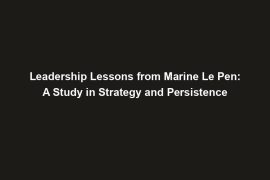Hey there, have you ever heard of Jacques Delors? If not, no worries – today we’re going to dive into the world of this incredible leader and learn some valuable lessons from his legacy.
Jacques Delors was a key figure in European politics, serving as the President of the European Commission from 1985 to 1995. His leadership was instrumental in shaping the future of Europe and the European Union as we know it today. By studying successful leaders like Delors, we can gain insights that can help us grow and develop personally and professionally.
So, let’s explore some key lessons we can learn from Jacques Delors. We’ll talk about his vision and strategic direction, his approach to collaboration and consensus-building, as well as his adaptability and resilience in face of challenges. Stay tuned for some practical tips on how to apply these lessons to your own leadership journey. Let’s dive in and discover the enduring legacy of Jacques Delors together!
Vision and Strategic Direction
One of the key leadership lessons we can learn from Jacques Delors is the importance of having a clear vision and strategic direction. Delors was able to articulate a compelling vision for the future of Europe and the European Union, focusing on economic integration and social cohesion. His strong leadership vision not only inspired others but also motivated them to work towards common goals.
Think of a vision as a roadmap that guides a leader and their team towards a desired destination. Just like how a GPS helps you navigate unfamiliar territory, a strong vision provides direction and purpose for everyone involved. When a leader communicates their vision effectively, it can align the team’s efforts, foster collaboration, and drive innovation.
Collaboration and Consensus-Building
Another important lesson we can learn from Delors is his approach to collaboration and consensus-building. Within the European Commission, Delors was known for his ability to bring together member states with differing views and interests to reach common agreements. This required strong communication skills, relationship-building, and a commitment to finding solutions that benefit everyone involved.
Imagine trying to plan a group trip with friends who all have different preferences on destinations and activities. It takes patience, open communication, and a willingness to listen to others’ perspectives to find a compromise that everyone can agree on. Similarly, in leadership roles, the ability to build consensus and foster collaboration is essential for driving progress and achieving success.
Adaptability and Resilience
Delors’ leadership also highlighted the importance of adaptability and resilience in the face of challenges. He was able to navigate changing political landscapes and economic uncertainties with grace, adjusting his strategies as needed to overcome obstacles. Effective leaders, like Delors, understand that setbacks are inevitable but can also be valuable learning opportunities.
Think of a bamboo tree that bends but does not break in a storm. Adaptability allows leaders to respond to unexpected changes or setbacks with flexibility and resilience, bouncing back stronger than before. By embracing change and remaining agile in their approach, leaders can navigate uncertainties and steer their organizations towards success.
Applying Delors’ Leadership Lessons Today
Now that we’ve unpacked some key leadership lessons from Jacques Delors, let’s explore how these insights can be applied to today’s challenges in the business world. Delors’ emphasis on vision, collaboration, and adaptability can serve as a guiding light for leaders navigating a rapidly changing landscape.
Enhancing Vision
One of the most powerful tools in a leader’s arsenal is a clear and compelling vision. Delors understood the importance of articulating a bold vision for Europe’s future, inspiring others to rally around a common goal. Today’s leaders can take a page from Delors’ playbook by developing a strong vision that motivates their teams and aligns everyone towards a shared purpose. By setting ambitious goals and communicating them effectively, leaders can ignite passion and drive momentum within their organizations.
Fostering Collaboration
Collaboration and consensus-building were at the heart of Delors’ leadership style. In a world that is increasingly interconnected, the ability to work effectively with diverse stakeholders is more important than ever. Leaders who can build strong relationships, communicate openly, and foster a culture of collaboration will be better equipped to tackle complex challenges and drive innovation. By following Delors’ example of inclusive decision-making, today’s leaders can build trust and create a more cohesive and productive team.
Prioritizing Adaptability
As Delors demonstrated, adaptability and resilience are essential qualities for effective leadership. In a fast-paced and unpredictable business environment, the ability to pivot, learn from setbacks, and leverage change as an opportunity for growth is critical. Leaders who remain flexible, open to new ideas, and willing to evolve with the times will be better positioned to thrive in the face of adversity. By embracing Delors’ mindset of constant adaptation, leaders can stay nimble and responsive to shifting market dynamics.
Conclusion: Embracing Delors’ Legacy
In conclusion, Jacques Delors’ legacy serves as a beacon of inspiration for leaders seeking to make a meaningful impact in their organizations and beyond. By incorporating Delors’ leadership lessons on vision, collaboration, and adaptability, today’s leaders can cultivate a culture of excellence, resilience, and progress. As we strive to navigate the challenges of the modern world, let us look to the enduring wisdom of Delors and commit to continuous learning and growth in our leadership journey.



